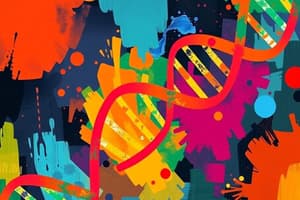Podcast
Questions and Answers
What is the subject of the first lecture?
What is the subject of the first lecture?
Forensic evidence
What is the main focus of the first lecture?
What is the main focus of the first lecture?
Forensic biology
In which stage does the first lecture take place?
In which stage does the first lecture take place?
First stage
Which of the following types of compounds are typically considered part of organic chemistry?
Which of the following types of compounds are typically considered part of organic chemistry?
What is the reason behind the unrivaled chemical diversity of carbon?
What is the reason behind the unrivaled chemical diversity of carbon?
Why is organic chemistry significant in the study of living organisms?
Why is organic chemistry significant in the study of living organisms?
What is a characteristic of carbon that contributes to its chemical diversity?
What is a characteristic of carbon that contributes to its chemical diversity?
What is a notable fact about elemental carbon?
What is a notable fact about elemental carbon?
Flashcards are hidden until you start studying
Study Notes
Introduction to the Course
- The course starts with the first lecture, which has a specific subject that has not been specified yet.
- The first lecture takes place in a particular stage, but the exact stage has not been mentioned.
- The main focus of the first lecture is also unknown, awaiting more information to be revealed.
Organic Chemistry
- Organic chemistry is the study of the chemistry of carbon compounds.
- Carbon has a chemical diversity unrivaled by any other chemical element.
Properties of Carbon
- Carbon atoms bond reasonably strongly with other carbon atoms.
- Carbon atoms bond reasonably strongly with atoms of other elements.
- Carbon atoms make a large number of covalent bonds (four).
Abundance of Carbon
- Elemental carbon is not particularly abundant.
- It does not even appear in the list of the most common elements in Earth’s crust.
Organic Compounds
- All living things consist of organic compounds.
- Most organic chemicals are covalent compounds.
Exclusions from Organic Chemistry
- Compounds containing carbonate ions and bicarbonate ions are not considered part of organic chemistry.
- Carbon dioxide and carbon monoxide are not considered part of organic chemistry.
Studying That Suits You
Use AI to generate personalized quizzes and flashcards to suit your learning preferences.




